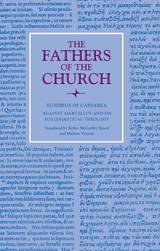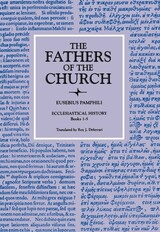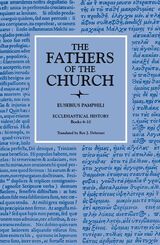
On Ecclesiastical Theology, composed circa 338/339 just before Eusebius’s death, and perhaps in response to the amnesty for deposed bishops enacted by Constantius after the death of Constantine in 377 and the possibility of Marcellus’s return to his see, continues to lay out the criticisms initially put forward in Against Marcellus, again utilizing quotations from Marcellus’s book against Asterius. However, we see in this text a much more systematic explanation of Eusebius’s objections to the various elements of Marcellus’s theology and what he sees as the proper orthodox articulation of those elements.
Long overlooked for statements at odds with later orthodoxy, even written off as heretical because allegedly “semi-Arian,” recent scholarship has demonstrated the tremendous influence these texts had on the Greek theological tradition in the fourth century, especially on the orthodox understanding of the Trinity. In addition to their influence, they are some of the few complete texts that we have from Greek theologians in the immediate period following the Council of Nicea in 325, thus filling a gap in the materials available for research and teaching in this critical phase of theological development.



Abbatial annals of medieval England.
Bede “the Venerable,” English theologian and historian, was born in AD 672 or 673 in the territory of the single monastery at Wearmouth and Jarrow. He was ordained deacon (691–2) and priest (702–3) of the monastery, where his whole life was spent in devotion, choral singing, study, teaching, discussion, and writing. Besides Latin he knew Greek and possibly Hebrew.
Bede’s theological works were chiefly commentaries, mostly allegorical in method, based with acknowledgment on Jerome, Augustine, Ambrose, Gregory, and others, but bearing his own personality. In another class were works on grammar and one on natural phenomena; special interest in the vexed question of Easter led him to write about the calendar and chronology. But his most admired production is his Ecclesiastical History of the English Nation. Here a clear and simple style united with descriptive powers to produce an elegant work, and the facts diligently collected from good sources make it a valuable account. Historical also are his Lives of the Abbots of his monastery, the less successful accounts (in verse and prose) of Cuthbert, and the Letter (November 734) to Egbert his pupil, so important for our knowledge about the Church in Northumbria.
The Loeb Classical Library edition of Bede’s historical works is in two volumes.

The first comprehensive history of early Christianity.
Eusebius of Caesarea (ca. AD 260–340), born in Palestine, was a student of the presbyter Pamphilus, whom he loyally supported during Diocletian’s persecution. He was himself imprisoned in Egypt, but became Bishop of Caesarea around 314. At the Council of Nicaea in 325 he sat by the emperor, led a party of moderates, and made the first draft of the famous creed.
Of Eusebius’ many learned publications we have the Martyrs of Palestine and the Life of Constantine; several apologetic and polemic works; parts of his commentaries on the Psalms and Isaiah; and the Chronographia, known chiefly in Armenian and Syriac versions of the original Greek. But Eusebius’ chief fame rests on the History of the Christian Church in ten books, published in 324–325, the most important ecclesiastical history of ancient times, a great treasury of knowledge about the early Church.

Abbatial annals of medieval England.
Bede “the Venerable,” English theologian and historian, was born in AD 672 or 673 in the territory of the single monastery at Wearmouth and Jarrow. He was ordained deacon (691–2) and priest (702–3) of the monastery, where his whole life was spent in devotion, choral singing, study, teaching, discussion, and writing. Besides Latin he knew Greek and possibly Hebrew.
Bede’s theological works were chiefly commentaries, mostly allegorical in method, based with acknowledgment on Jerome, Augustine, Ambrose, Gregory, and others, but bearing his own personality. In another class were works on grammar and one on natural phenomena; special interest in the vexed question of Easter led him to write about the calendar and chronology. But his most admired production is his Ecclesiastical History of the English Nation. Here a clear and simple style united with descriptive powers to produce an elegant work, and the facts diligently collected from good sources make it a valuable account. Historical also are his Lives of the Abbots of his monastery, the less successful accounts (in verse and prose) of Cuthbert, and the Letter (November 734) to Egbert his pupil, so important for our knowledge about the Church in Northumbria.
The Loeb Classical Library edition of Bede’s historical works is in two volumes.

The first comprehensive history of early Christianity.
Eusebius of Caesarea (ca. AD 260–340), born in Palestine, was a student of the presbyter Pamphilus, whom he loyally supported during Diocletian’s persecution. He was himself imprisoned in Egypt, but became Bishop of Caesarea around 314. At the Council of Nicaea in 325 he sat by the emperor, led a party of moderates, and made the first draft of the famous creed.
Of Eusebius’ many learned publications we have the Martyrs of Palestine and the Life of Constantine; several apologetic and polemic works; parts of his commentaries on the Psalms and Isaiah; and the Chronographia, known chiefly in Armenian and Syriac versions of the original Greek. But Eusebius’ chief fame rests on the History of the Christian Church in ten books, published in 324–325, the most important ecclesiastical history of ancient times, a great treasury of knowledge about the early Church.
READERS
Browse our collection.
PUBLISHERS
See BiblioVault's publisher services.
STUDENT SERVICES
Files for college accessibility offices.
UChicago Accessibility Resources
home | accessibility | search | about | contact us
BiblioVault ® 2001 - 2024
The University of Chicago Press









